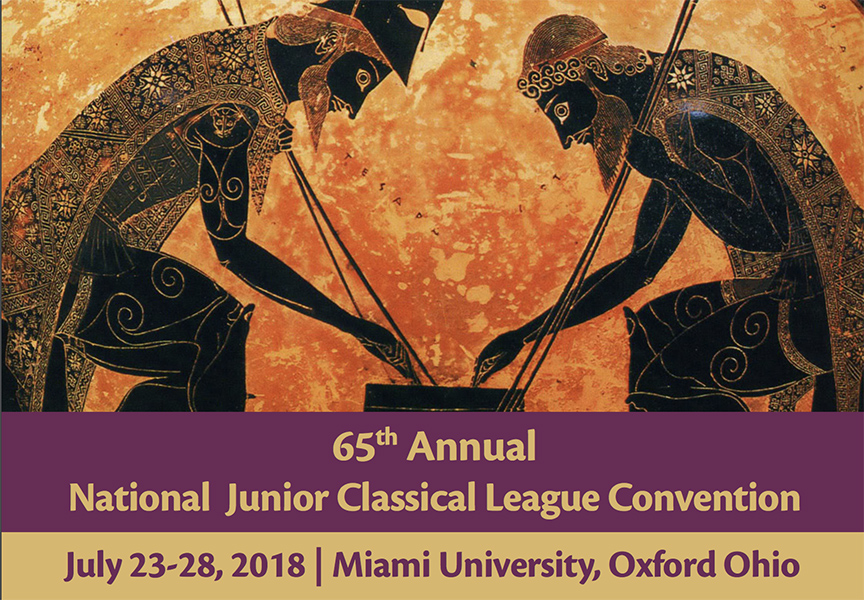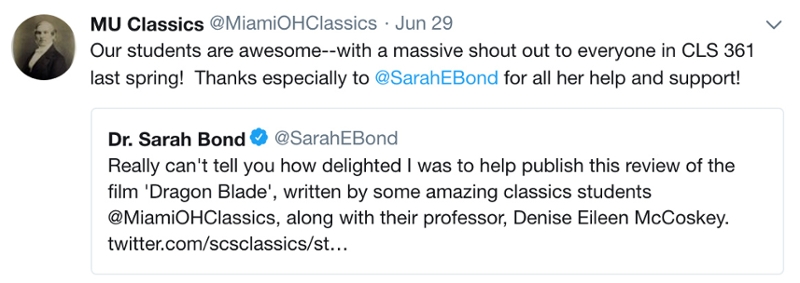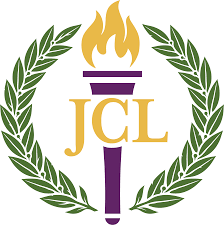
What do Cleopatra, the Romans and Greek mythology have in common?
1,300 middle and high school students who will celebrate the classics at Miami
 By Margo Kissell, university news and communications
By Margo Kissell, university news and communications
Catherine Sturgill was a freshman in high school when she joined the National Junior Classical League in 1981 because of her interest in Latin.
That same year, she attended her first national convention at Miami University.
Sturgill went on to become a Latin teacher and taught for 17 years in Florida. Now retired, she’ll return to Miami next week for the league’s annual convention. This will be her fourth time back.
The campus will become home to 1,300 middle and high school students taking part in the convention July 23-28.
Sturgill, of Atlanta, has a strong sense of why the classics remain relevant and interesting today, even to this latest generation of youth.

Katie Paul, Miami '08 (above) and Jacob Butera, Miami '03, were classics
“I think a lot of the kids enjoy studying the history and mythology of the Romans and Greeks to see how the world has changed, or even how it hasn’t changed,” she said. “There are so many interesting things kids can study with it.”
And they have a ball doing it during a convention packed with fun events.
Fellowship, competition and creativity
During the week, students will compete in areas such as testing (includes grammar, mythology, reading comprehension, Latin and Greek derivatives, Roman and Ancient Greek history), Certamen (Latin brain bowl), graphic arts, creative arts and Olympika events including running, swimming and track. A Roman procession on the last full day concludes with a Roman banquet.
“I hope students meet other students from around the country, enjoy the fellowship, excel in their competitions and see the variety of what the classics, including Latin and Greek, have to offer,” said Sturgill, committee chair.
The national event moves from campus to campus each year. For years, Miami housed the American Classical League on campus.
 “Having our national convention at Miami always feels like coming home,” said Sturgill.
“Having our national convention at Miami always feels like coming home,” said Sturgill.
The study of Greek and Latin classics was a centerpiece of the curriculum at Miami when it was founded in 1809, according to Miami’s department of classics website.
“The classical humanities make up one of the few subjects taught continuously” at the university since then “and this continuity typifies Miami’s long-standing commitment to the humanities and to liberal education.”
Miami classics alumni Katie Paul and Jacob Butera (right) continue the commitment.
- Paul majored in ancient Greek and anthropology and earned a master's degree at George Washington University. She is currently a Fellow for the Antiquities Coalition. She uses media and social media to identify patterns and cycles of heritage crimes in Egypt and the MENA (
Middle East and North Africa) region. - Butera majored in classics and ancient Greek and earned his doctorate from Duke University. He is currently an assistant professor of classics at the University of North Carolina, Asheville.
Miami experts have fun sharing knowledge
 Steven Tuck, department chair, will work with the young students during the convention by leading a session about magical amulets.
Steven Tuck, department chair, will work with the young students during the convention by leading a session about magical amulets.
“In a world full of magic, but lacking vaccines, hand sanitizer, and other modern ways of protecting oneself from invisible harm, the Romans turned to magical amulets,” the program says. Tuck will concentrate on the bulla, a form of
 Former chair Judith de Luce, professor emerita, will lead a session titled “Will the REAL Cleopatra Please Stand Up?” The program thumbnail calls Cleopatra VII (69-30 BCE) “the last Egyptian pharaoh who is most often remembered for relationships with Julius Caesar and Marc Antony” and has been the subject of Hollywood movies and some “awful” novels.
Former chair Judith de Luce, professor emerita, will lead a session titled “Will the REAL Cleopatra Please Stand Up?” The program thumbnail calls Cleopatra VII (69-30 BCE) “the last Egyptian pharaoh who is most often remembered for relationships with Julius Caesar and Marc Antony” and has been the subject of Hollywood movies and some “awful” novels.
"Cleopatra was one of three powerful women who nearly beat the Romans at their own game, but what do we actually know about her?" the program says.
Want to know more about classics at Miami?
- Follow them on Twitter — and learn how the classics are relevant to contemporary culture (see Tweets above).
- Read more alumni profiles on the department of classics website.
What is the National Junior Classical League?
 The National Junior Classical League is an organization for middle and high school students in classical courses. It is one of the largest academic youth organizations in the world, with more than 50,000 members in approximately 1,200 chapters, located in almost every state and in several foreign countries. Established in 1936, the organization seeks to promote the study of Latin and Greek, to benefit students and teachers alike, and to impart an understanding of the debt of our own culture to that of classical antiquity.
The National Junior Classical League is an organization for middle and high school students in classical courses. It is one of the largest academic youth organizations in the world, with more than 50,000 members in approximately 1,200 chapters, located in almost every state and in several foreign countries. Established in 1936, the organization seeks to promote the study of Latin and Greek, to benefit students and teachers alike, and to impart an understanding of the debt of our own culture to that of classical antiquity.
